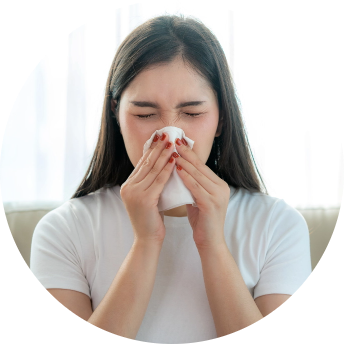About Chronic Rhinosinusitis with Nasal Polyps
What are Nasal Polyps?
Nasal polyps are non-cancerous growths that form in the lining of the nasal passages, often as a result of inflammation from chronic rhinosinusitis (CRS), termed CRS with nasal polyps (CRSwNP).1 The condition is often characterized by long-term disease burden and associated with poor quality of life.2 Studies have shown that CRS aects approximately 12.8% of the Malaysian population and 10.7% in Singapore.3,4
The polyps often resemble hanging grapes or are teardrop-shaped.5,6 They are commonly yellow in colour, but can also be white, grey or pink.1,5 Because nasal polyps usually aect both nasal passages, their presence on only one side might require further examination, as this could indicate a malignant growth.7

Who is affected by nasal polyps?
Nasal polyps are estimated to aect 1–4% of the general population.8 They occur in 20% of individuals with CRS.7 Its incidence increases with age, reaching a peak at age 60 years, and is twice as common in men than in women.1,5
References:
1. Hopkins C, et al. N Engl J Med 2019; 381:55-63.
2. Fokkens WJ, et al. Rhinology 2023;61:194-202.
3. Peter SS, et al. J Int Dent Medical Res 2020; 13:1365-1369
4. Wang X, et al. (2022). Epidemiology. In: Zhang L, Bachert C. (eds) Chronic Rhinosinusitis. Springer, Singapore.
5. Patient. Nasal polyps. Last updated: September 2022. Available at: https://patient.info/ears-nose-throat-mouth/nasal-polyps-leaflet#nav-1. Accessed on September 2023.
6. MSD Manual. Nasal polyps. Last updated July 2023. Available at: https://www.msdmanuals.com/home/ear,-nose,-and-throat-disorders/nose-and-sinus-disorders/nasal-polyps#. Accessed on September 2023.
7. American Academy of Allergy Asthma & Immunology. Nasal Polyps. Available at: https://www.aaaai.org/tools-for-the-public/conditions-library/allergies/nasal-polyps. Accessed on April 2023.
The health information contained herein is provided for general educational purposes only. Your healthcare professional is the single best source of information regarding your health. Please consult your healthcare professional if you have any questions about your health or treatment.